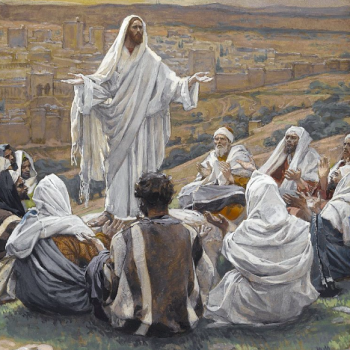So is that what you see happening when you go into the Bay Area classrooms? What is it like for students to hear about slavery? Is it a kind of emotional explosion?
All the way around, this whole issue, this whole injustice issue is really reaching into the souls of young people. It's tugging at them. And I am really, really excited to see what it does.
For one thing, they lock in. Kids who you think would not be paying attention to you when you're talking about something, just literally stare at you. They're not causing a scene, they're not talking, they're not in the back giggling. I mean, with a lot of stuff, after about 20 minutes adolescents are like, okay, what's next, but you can speak for an hour about issues of injustice and human rights, and you can literally hear a pin drop. It's amazing.
They're just so intensified on this because I think they finally say, "Where do I have a voice? I don't ever get a voice. People say I don't understand, people say I'm not old enough, I don't have enough experience, what do I know?" People say this about nearly every issue that comes up that a young person wants to speak into. And they just shut them down, telling them, "You don't have any idea of the world, so you don't have a voice in this." With this one, they are saying, "No, you obviously don't understand. This is my generation getting killed off. This is my generation getting sold off. This is my generation's voice that's getting muffled and sold and killed. I do have a voice in this. I do have the right to speak my mind on this."
Dave's got kids who are in Little League or in the Junior Soccer League who have said, "I'll put in 25 cents for every goal that I score on my Junior Soccer team." So he gives a dollar. But think about it: think about how many thousands or hundreds of thousands of kids play soccer out there. Let's just say, for argument's sake, every one of them commits 25 cents a goal. One hundred thousand kids, each scores one goal, that's $25,000.00! And it's feasible for a 12-year-old kid or a 10-year-old kid to say, I can do chores, or something, but I'll raise a buck. I'll get a dollar from somewhere.
The ability to create in these kids the feeling of "I want to achieve something, not only for myself, but for somebody else who does not have," that scenario is not there right now in the world on a social scale. But, you're creating kids now who will always think that way, so now we've got awesome things happening. Their success is for them and for somebody else.
And someone else knows they were rescued because someone helped provide, and the way they provided was by setting goals, dreaming dreams, and becoming somebody great. So now that kid, who's been rescued, now he wants to do that, and he definitely wants to save somebody because he was saved. So now you create this whole coup against people who are inhumane. Because they'll start revolting against anyone who will let slavery happen. Instead of participating in it, we'll figure out a way to ruin them.
The more people I can make aware of this the better because when you think about all the slaves every year brought into the U.S. -- I mean, this is a country people run to for freedom -- 18,000 people a year are not getting that same deal, and you multiply that over ten years and that's almost 200,000 people and it gets worse and worse, and 18,000 is only a guesstimate. It could be much worse than that.
You said you got into this because of an existing passion for youth ministry, which means that for you, working for human rights must come down to Jesus.
I've had this passion for young people. How can we get young people to understand who Jesus is? I read a study that said only 4% of young people who attend church during high school continue to attend church after leaving high school. So 96% just say, okay, I did that, I'm out. They have no reason to stay.
In my opinion they would stay if they really understood God -- the way he is, as a lover of human souls who sent his Son to die -- and the joy of Jesus. If you read about the character of God and who he is and what he is about, if you read Psalm 91, or read Psalms at all, if you reflect on David's adoration for God and you think about that, if he is all that, then why don't I want that? I mean, no one's going to leave that.
I believe that kids are not realizing who God is, and who Jesus is, in his full form. So for me, how do I help with that? I've spent years reading and asking God, and I really believe that he gave me the opportunity to reflect the love of Jesus in an awesome way where there's actually fulfillment -- where a young person says, if this, what I feel right now, is Jesus, then this is what I want.





